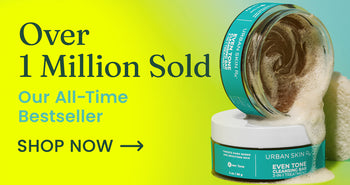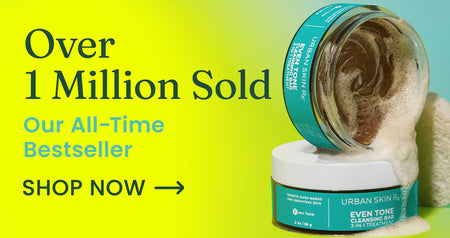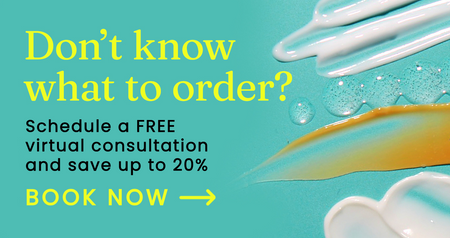Retinoid vs. Retinol: Which One Should You Be Using?

Keeping our skin looking smooth and glowing takes a lot more work than it did when we were twenty-one and could wake up after a late night out and a couple, okay, a few, cocktails looking bright-eyed and bushy-tailed by default. Many products are recommended to keep your complexion looking like you woke up like this, but few are recommended more frequently than retinols and retinoids.
If you spend even a few minutes researching skincare solutions, those names should be familiar to you! You might even use one of them in your daily or nightly routine.
But do you know what the differences are, and if you’re using the best one to get the results you're after? Because let’s be honest —there’s only a few letters of difference between the two, so we don’t blame you if that’s where your research stopped.
So let’s revisit. If you’re going to use something on something as special and important to your self-esteem as your face, you should know what you’re getting into!
What are retinols and retinoids, and which one should you be using?
Retinoids
Let’s start by getting to the bottom of what these miracle ingredients are and why they work. Retinoids are Vitamin A-based —if you’re a skincare guru, you’ve probably heard about the benefits of Vitamin A before. While most retinoids are topical, meaning you apply them to the surface of your skin, in some cases you may be prescribed an ingestible version of a retinoid to treat acne and other skin-related troubles.
Retinoids can be purchased over the counter, but it’s important to check the concentration. Often over the counter retinoid solutions contain retinoids in very minimal amounts, so before you splurge on a retinoid cream, make sure it’s worth your while. Prescription-strength retinoids can be given by your dermatologist.
Retinoids can help create new blood vessels in your skin. This both lessens the appearance of wrinkles and fine lines and improves the color and tone of your skin.
Retinoids often come in a stronger concentration than other skincare heroes, and so they can cause irritation and dryness in your skin. But this doesn’t mean they’re not working! It’s best to ease into the use of a retinoid so as not to overwhelm your skin.
It’s a bit frustrating if you’re looking to get your glow on for a wedding next weekend, but retinoids are a marathon, not a sprint. Retinoids can take a few months to a year to show their best results, so if your skin isn’t shining and line-free after a week of use, it’s no reason to worry!
Retinols
Retinols are similar to retinoids in more ways than just spelling! It’s easy to understand why people sometimes use the two interchangeably. But there are some key differences. Retinols are Vitamin A-based, just like retinoids. But they’re the more common over-the-counter version you’ll find in creams and serums.
Retinols motivate your body to produce more collagen and elastin, thereby improving anything that’s bothering you about your complexion, from fine lines to enlarged pores. Retinols also act as mild exfoliators, adding to their skin-saving effects. It’s sometimes used to treat acne scars, and may even help control oily skin.
What’s the Difference?
You may have picked up on it by now! When it comes to comparing retinols and retinoids, in general, the main difference is in strength. Retinoids are most commonly acquired with a prescription from your dermatologist. As such, they tend to be much stronger than their over-the-counter counterparts.
If you’re looking for a really serious solution to almost any skincare woe, and you have access to a trusted dermatologist, a prescription retinoid is a great option.
Retinols, on the other hand, are a weaker solution available over the counter. They are Vitamin A-based, like retinoids, and used to treat the same issues. They may take longer to work, and may ultimately not perform as well as retinoids if your skincare complaints are more significant. But if you have sensitive skin or a trip to the dermatologist isn’t in the cards, retinols are great, effective options to help you get your glow on.
That said, you might come across some over-the-counter retinoid options out there, and while we can’t speak to what works best for your individual skin, it’s worth doing a bit of research before committing!
Because retinoids are broadly prescription only, an over-the-counter version implies that the concentration of retinoids is extremely low. It may seem counterintuitive, but it’s likely that a retinol solution will actually be stronger and more effective!
Which One Should You Use?
It mainly comes down to you, your skin type and your dermatologist. We’ll always recommend speaking to a professional if you can and if you have trouble with your skin that you haven’t been able to help by over-the-counter means.
Especially if you’ve been using retinol religiously for up to a year and still have an uneven skin tone or aren’t happy with the improvement to your wrinkles or fine lines, it might be time to move up to the next level: retinoids.
If your skin tends to be super sensitive, retinol may be a better option. Both retinols and retinoids can cause dryness and irritation, but simply by virtue of being a weaker solution, retinol might be more gentle. That said, just because your skin is a bit more reactive doesn’t mean you can’t use retinoids! It just might be better to start out with something with a more mild solution to start.
If you’re mainly looking for something preventative —we’ve often heard it said that you should work retinol into your routine before you’re thirty —retinol might be the way to go there, too.
A gentler retinol solution used consistently can do wonders for making sure that you’re thirty, flirty, and thriving rather than giving yourself new frown lines every time you look in the mirror. Any of the products in our Anti-Aging Essentials Package will go a long way toward turning back the clock on your skin.
How Do You Use Them?
There are lots of ways to incorporate retinols or retinoids into your routine. Because retinoids are mostly available only with a prescription, it’s important to follow the advice of your dermatologist or pharmacist when it comes to them.
If you’re looking to incorporate retinol into your regimen to reduce hyperpigmentation, acne scars or an uneven skin tone, our Retinol Rapid Repair and Dark Spot Treatment is a great value add to your product lineup.
You can also use Retinol Resurfacing Treatment Pads if you’re looking for something in a professional-grade solution that’s a bit different from your usual cream or moisturizer.
When using any retinol or retinoid, it’s important to keep up with your SPF and your moisturizer. Retinols and retinoids can be drying, and may also make your skin more vulnerable to the sun’s rays.
When first using a retinol or retinoid, be sure to ease into it to give your skin some time to adjust. Unless your dermatologist gives you different instructions, it’s best to start applying retinol only every three days or so and to pay attention to how your skin reacts. If you don’t have any adverse effects, you can gradually increase your usage to your desired amount.
Can You Avoid Skin Irritation With Retinols and Retinoids?
The short answer is yes! Because not all skin types will have a negative reaction to everything. It’s hard to know how your body will react to something until it’s exposed to it.
Suppose you have particularly sensitive skin and you’re worried about making whatever problem you’re trying to solve worse. In that case, it might be worth testing the retinol or retinoid you’d like to use on a small area of skin first to be sure it’s manageable.
This makes retinol ideal to add to your nighttime routine along with a thick, ultra-moisturizing night cream like our Mega Moisture Illuminating Night Cream. This is also a great time to use your retinol because it helps lessen the potential photosensitivity caused by retinol because there’s more time between sunshine and application.
And as we’ve mentioned, the best way to avoid undue irritation is to ease into it. We totally get the impatience —when something is shown to have the great results that retinols and retinoids do, it’s difficult to resist just diving in head first!
But your skin will thank you for taking it slow. You’ll want to gradually build up your skin’s tolerance to retinol before you start using it every day.
It’s also important, as always, to read product labels carefully. Because it’s such a great ingredient, most products that use retinol in their solution will advertise it clearly. But just in case, it’s crucial to be sure you’re not accidentally (or intentionally!) doubling up on retinol or retinoids, which could increase the stress to your skin.
Do Retinoids and Retinols Work for All Skin Tones?
In short: yes.
Retinols and retinoids can be effective for all skin tones. However, retinoids and retinols pose a greater risk for more significant side effects on darker skin tones. Whereas the negative side effects of retinols on lighter complexions tend to stop at dry and flaky, in more melanin-rich complexions, that dryness can potentially cause hyperpigmentation.
If you have a darker skin tone and you’re prone to trauma- or damage-induced hyperpigmentation, retinols and retinoids might not be for you. That said, the positive effects of retinols and retinoids are the same in both dark and light skin tones —they can help to even out your skin tone, give you a gorgeous glow and help prevent or improve signs of aging. And as long as your skin plays nicely with retinols, it can help hyperpigmentation rather than cause it.
So don’t let the potential side effects deter you! If you’re at greater risk for negative side effects, start slowly. Use a very low concentration of retinol, begin with only a couple of days a week, and gradually increase your usage and concentration as long as your skin tolerates it.
You can also apply a layer of moisturizer to your skin before using your retinol, which can help by slowing your skin’s absorption of the retinol and lowering your likelihood of irritation.
In Conclusion
Retinols and Retinoids are both highly effective treatments when it comes to all kinds of complexion complaints! If you’re struggling with acne or the scars it leaves, aging, hyperpigmentation or an uneven skin tone, retinol or retinoid can go a long way toward giving you the flawless, glowing complexion you deserve.
However, both retinoids and retinols can take a while to work —it’s important to be patient! It can be tempting to load up on a strong product if you’re after fast results, but with both of these solutions, patience and consistency are key. So if you’re finding your complexion a little lackluster as time goes on, incorporating over-the-counter retinol or even a prescription retinoid into your skincare regimen might be the thing to take your skin from “oh, god” to goddess.
Engagement Manager



